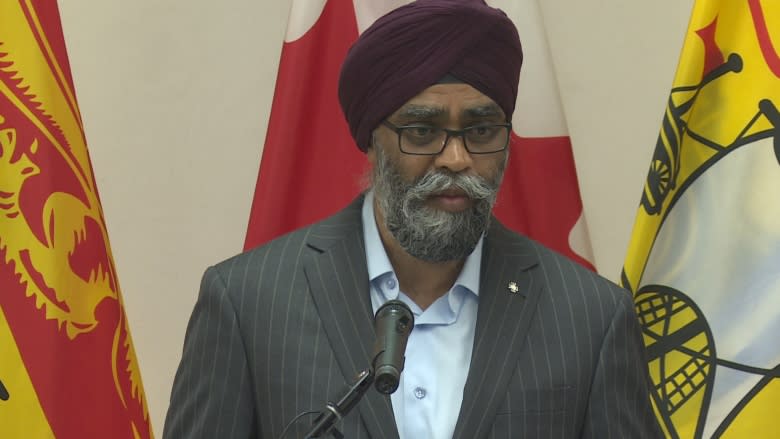National Defence turns attention to military families stressed by moves
Canada's defence minister was in New Brunswick on Tuesday to introduce a program aimed at making military moves less stressful for soldiers and their families.
"There are significant challenges that our families have to go through and we want to make sure to make it easier for them," Harjit Sajjan said.
The new program, called Seamless Canada, will address such move-related issues as landing at the bottom of the queue to see a doctor, delays in obtaining new health cards and driver's licences, a spouse that might have credentials in one province but not another, and the transition to new schools for military children.
- The toughest battle of his life: Retired soldier coping with PTSD
- Brothers in arms: Ron and Ryan Anderson both survived tours in Afghanistan — but not PTSD
In New Brunswick, for instance, the provincial government hopes to get doctors accepting new patients to reserve openings for transferring families.
"We have a role as a provincial government to try to reduce some red tape, clarify what needs to be done, make sure that it can be done as rapidly as possible to help families be able to get into the community," Premier Brian Gallant at the Base Gagetown said as he announced the province's involvement in the Seamless Canada program.
Throughout their careers, military families are often required to relocate to bases and wings across the country.
Sajjan said many people know what it's like to have to concentrate on work while worrying about family matters.
"Imagine our military members, the challenging work that they do," he said.
He said the issues are different, depending on the province.
A 2013 report by Pierre Daigle, at the time an ombudsman with the military, said relocating is one of the most unsettling aspect of life in the Canadian Armed Forces.
"Today military families likely still experience a lot of that anxiety when it comes to relocation," he said.
CBC News asked Base Gagetown officials to talk about some of the issues military families face when coming to New Brunswick in particular, but a spokesperson did not feel equipped to respond.
'Easier to move to a foreign country'
Kimberly Martin moved to Quebec from New Brunswick with her family in 2016 because her fiancé is in the military.
"We've been told by multiple people, moving to Quebec was worse than moving to a foreign country," she said.
Martin said it took her two children eight months to get their health cards, describing the process as "insane."
"We couldn't even go to clinics here because you need to call and you can't get past the first part without a health-care number to book an appointment," she said.
The Martins, who initially thought they would only be living in Quebec for a year, applied for their health cards in the fall of 2017.
"People who lived here before us told us, 'Don't bother applying for health care if you're only here for a year,'" she said. "It's too much of a hassle."
The couple still have friends in the military who are waiting for doctors in Quebec.
Now, the mother of two is hopeful the department's Seamless program will alleviate some of the problems for military families and her own family.
"It has been super tough," she said.
Starting over
Erin Young and her husband, Randy, moved to New Brunswick almost a year ago. In nine years, the couple moved from Kingston, Ont., to Cold Lake, Alta., to Oromocto.
One of the hardest parts of moving is starting over, said Erin, whose husband has been deployed for the past two months.
"New friendships, starting new jobs, having to go through all the paperwork, and change over registration," she said.
The pregnant mother of two said the hardest part about moving to New Brunswick was finding a doctor. Her family lucked out, she said, because her husband is originally from the Oromocto area and his relatives helped them get a doctor.
Young said she expects to go through all those changes again someday.
"It would definitely make it easier to have that fast track," she said.
Issues vary across Canada
Because the issues vary from province to province, Seamless Canada won't be rolling out at the same time across the country.
Sajjan would not discuss the program's costs, saying National Defence is focusing instead on "looking after members" and their families and getting through "red tape."
At the end of June, Sajjan met with representatives from all provinces and territories to discuss improving the relocation experience.
They came up with ways to solve issues unique to their own provinces.
"In Quebec some of the challenges could be different from British Columbia," he said.
But there is no timeline for any of the changes being contemplated, he said.
The goal of the meeting was to increase governments' awareness of issues specific to military families to establish conditions that would improve the transition in moves among provinces and territories.
"It's recognizing … the service the families provide to Canada as well," Sajjan said.



